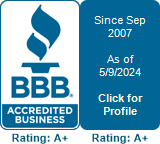Which Type of Accounting Help Does Your Business Need?
- By Admin
- •
- 01 Aug, 2022
- •
Every business needs one or more individuals who manage and guide its finances. But business owners also have a wide range of choices in who they hire or work with to do this job. Which is right for your small enterprise? The answer depends on what you need done and what your goals are.
Here are a few key things to know about the primary accounting functions in companies and what they mean for the business.
1. Bookkeeper
One of the most common positions that small businesses hire is a bookkeeper. This person does most or all of the day-to-day management and entry of financial data. They often enter transactions, balance bank accounts, create invoices, write checks, correct errors, manage payroll, and assign costs to the right places.
Depending on how large the workload and what your budget is, you may work with a bookkeeping service to provide trained professionals or hire one on a part-time or full-time basis. Eventually, this position might even oversee data entry clerks as well. However, keep in mind that a bookkeeper does the legwork and guides you in correct accounting procedure, but they're not trained business strategists.
2. Controller
A controller is a key accounting position, but it's not one with which many people are familiar.
Controllers, as their title suggests, oversee (or control) the daily accounting operations of a business. They may manage other people — like bookkeepers, accountants, and assistant controllers — who do the on-the-ground work of data entry and analysis. The controller is responsible for ensuring regulatory compliance, proper application of accounting standards, preventing fraud, and overseeing other high-level finances.
3. Chief Financial Officer (CFO)
The CFO position is a management position. But, unlike the controller position, the CFO's job is largely to look forward rather than backward. A CFO makes recommendations to management, participates in high-level meetings, and helps implement overall business strategy. They serve as a captain for your financial ship.
For example, a CFO would take a past quarterly report prepared by the controller (using data entered by a bookkeeper) and use it to decide how to budget for the next quarter. They look for trends in the data to determine if costs are rising, for example, and determine if the company should renegotiate certain contracts or raise prices on a product line. They oversee the controller in implementing these changes.
4. Certified Public Accountant (CPA)
Not all accounting work for a small company must be handled by dedicated employees. A certified public accountant, or CPA, often works independently for client businesses. This allows you to contract with them for a few things, such as quarterly reviews or tax preparation, or a lot of tasks. CPAs generally don't do the daily work of transaction entry, but they can oversee your staff or their own bookkeepers in doing so.
By working with the right outside CPA, you gain access to highly trained individuals and an array of services without breaking the bank. They can help by answering questions about accounting procedures and how to handle specific situations. They’ll spot trends and patterns in your reports, protect against fraud, set up systems, and make business decisions.
Where to Start
Which of these important — but different — accounting positions does your small business need? Is it time to work with more than one person or add a new position to your staff?
No matter how you already manage the company's finances and what your budget or goals are, the best place to begin is by meeting with the team at Williams & Associates Tax Services. We'll assess your situation and recommend the right services to fit it. Call today to make an appointment or learn more.












